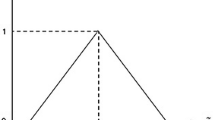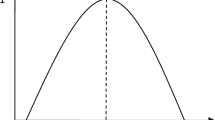Abstract
In this paper, we extend the classical assignment problem to the multicriteria assignment problem by considering three criteria: cost, time and quality subject to many realistic constraints including multi-job assignment and a knapsack-type resource constraint. The paper addresses the uncertainty of the real-life assignment problem by formulating a fuzzy cost–time–quality assignment problem using exponential membership functions. We define fuzzy goal for each criterion as per the preferences of the decision-maker and aggregate the fuzzy goals using product operator. In order to obtain optimal assignment plans, the resultant nonlinear 0-1 optimization problem is solved using genetic algorithm for different choices of the shape parameters in the exponential membership functions. As an illustrative example, we consider a fuzzy manpower planning problem.






Similar content being viewed by others
References
Belacela N, Boulasselb MR (2001) Multicriteria fuzzy assignment method a useful tool to assist medical diagnosis. Artif Intell Med 21:201–207
Bellman RE, Zadeh LA (1970) Decision making in a fuzzy environment. Manag Sci 17:141–164
Carlsson C, Korhonen P (1986) A parametric approach to fuzzy linear programming. Fuzzy Set Syst 20:17–30
Davis L (1991) Handbook of genetic algorithms. Van Nostrand Reinhold, New York
De PK, Yadav B (2011) An algorithm to solve multi-objective assignment problem using interactive fuzzy goal programming approach. Int J Contemp Math Sci 6:1651–1662
Eiben AE, Smith JE (2003) Introduction to evolutionary computing. Springer, Berlin
Feng Y, Yang L (2006) A two-objective fuzzy k-cardinality assignment problem. J Comput Appl Math 197:233–244
Goldberg DE (1989) Genetic algorithms in search optimization and machine learning. Addison-Wesley, Reading, MA
Herrera F, Lopez E, Mendana C, Rodriguez MA (1999) Solving an assignment selection problem with verbal information and using genetic algorithm. Eur J Oper Res 119:326–337
Holland JH (1975) Adaptation in natural and artificial systems. University of Michigan Press, Ann Arbor, MI
Holland JH (1992) Genetic algorithms. Sci Am 267:66–72
Huang DK, Chiu HN, Yeh RH, Chang JH (2009) A fuzzy multi-criteria decision making approach for solving a bi-objective personnel assignment problem. Comput Ind Eng 56:1–10
Inuiguchi M, Ichihashi H, Kume Y (1990) A solution algorithm for fuzzy linear programming with piecewise linear membership functions. Fuzzy Set Syst 34:15–31
Kagade KL, Bajaj VH (2010) Fuzzy method for solving multi-objective assignment problem with interval cost. J Stat Math 1:1–9
Kumar A, Gupta A (2011) Methods for solving fuzzy assignment problems and fuzzy travelling salesman problems with different membership functions. Fuzzy Inf Eng 1:3–21
Leberling H (1981) On finding compromise solutions in multicriteria problems using the fuzzy min-operator. Fuzzy Set Syst 6:105–118
Li RJ, Lee ES (1991) An exponential membership function for fuzzy multiple objective linear programming. Comput Math Appl 22:55–60
Li F, Xub LD, Jin C, Wang H (2012) Study on solution models and methods for the fuzzy assignment problems. Expert Syst Appl 39:11276–11283
Lin CJ, Wen UP (2004) A labeling algorithm for the fuzzy assignment problem. Fuzzy Set Syst 142:373–391
Lin CJ, Wen UP, Lin PY (2011) Advanced sensitivity analysis of the fuzzy assignment problem. Appl Soft Comput 11:5341–5349
Lin SY, Horng SJ, Kao TW, Fahn CS, Huang DK, Run RS, Wang YR, Kuo IH (2012) Solving the bi-objective personnel assignment problem using particle swarm optimization. Appl Soft Comput 12:2840–2845
Liu L, Gao X (2009) Fuzzy weighted equilibrium multi-job assignment problem and genetic algorithm. Appl Math Model 33:3926–3935
Liu L, Li Y (2006) The fuzzy quadratic assignment problem with penalty: new models and genetic algorithm. Appl Math Comput 174:1229–1244
Mendes JJM, Gonçalves JF, Resende MGC (2009) A random key based genetic algorithm for the resource constrained project scheduling problem. Comput Oper Res 36:92–109
Mukherjee S, Basu K (2010) Application of fuzzy ranking method for solving assignment problems with fuzzy costs. J Comput Appl Math 5:359–368
Papadimitriou CH, Steiglitz K (1982) Combination optimization: algorithms and complexity. Prentice-Hall, Englewood Cliffs, NJ
Pentico DW (2007) Assignment problem: golden anniversary survey. Eur J Oper Res 176:774–793
Qin Y, Zheng D, Zhao T (2012) Research on search results optimization technology with category features integration. Int J Mach Learn Cybern 3:71–76
Ridwan M (2004) Fuzzy preference based traffic assignment problem. Transport Res C 12:209–233
Rose C, Yates RD (1996) Genetic algorithms and call admission to telecommunications networks. Comput Oper Res 23:485–499
Sakawa M, Katagiri H, Matsui T (2011) Fuzzy random bilevel linear programming through expectation optimization using possibility and necessity. Int J Mach Learn Cybern. doi:10.1007/s13042-011-0055-7
Tada M, Ishii H (1998) Bicriteria fuzzy assignment problem. J Japan Soc Fuzzy Syst 10:867–875
Toroslu IH, Arslanoglu Y (2007) Genetic algorithm for the personnel assignment problem with multiple objectives. Inf Sci 177:787–803
Tsai CH, Wei CC, Cheng CL (1999) Multi-objective fuzzy deployment of manpower. Inter J Comp Int Manag 7:1–9
Wang S, Watada J, Pedrycz W (2009) Value-at-risk-based two-stage fuzzy facility location problems. IEEE Trans Ind Inf 5:465–482
Wang S, Watada J, Pedrycz W (2009) Recourse-based facility-location problems in hybrid uncertain environment. IEEE Trans Syst Man Cybern B Cybern 40:1176–1187
Wang S, Watada J (2012) Capacitated two-stage facility location problem with fuzzy costs and demands. Int J Mach Learn Cybern. doi:10.1007/s13042-012-0073-0
Wang XZ, He YL, Dong LC, Zhao HY (2011) Particle swarm optimization for determining fuzzy measures from data. Inf Sci 181:4230–4252
Wang XZ, Hong JR (1999) Learning optimization in simplifying fuzzy rules. Fuzzy Set Syst 106:349–356
Watada J (1997) Fuzzy portfolio selection and its applications to decision making. Tatra Mt Math Publ 13:219–248
Yang L, Liu B (2005) A multi-objective fuzzy assignment problem—new model and algorithm. In: The IEEE international conference on fuzzy systems, pp 551–556
Zimmermann H-J (1976) Description and optimization of fuzzy systems. Int J Gen Syst 2:209–215
Zimmermann H-J (1978) Fuzzy programming and linear programming with several objective functions. Fuzzy Set Syst 1:45–55
Acknowledgments
We are thankful to the Editor-in-Chief Professor Xi-Zhao Wang and the anonymous referees for their valuable comments and suggestions to improve presentation of the paper.
Author information
Authors and Affiliations
Corresponding author
Rights and permissions
About this article
Cite this article
Gupta, P., Mehlawat, M.K. & Mittal, G. A fuzzy approach to multicriteria assignment problem using exponential membership functions. Int. J. Mach. Learn. & Cyber. 4, 647–657 (2013). https://doi.org/10.1007/s13042-012-0122-8
Received:
Accepted:
Published:
Issue Date:
DOI: https://doi.org/10.1007/s13042-012-0122-8




